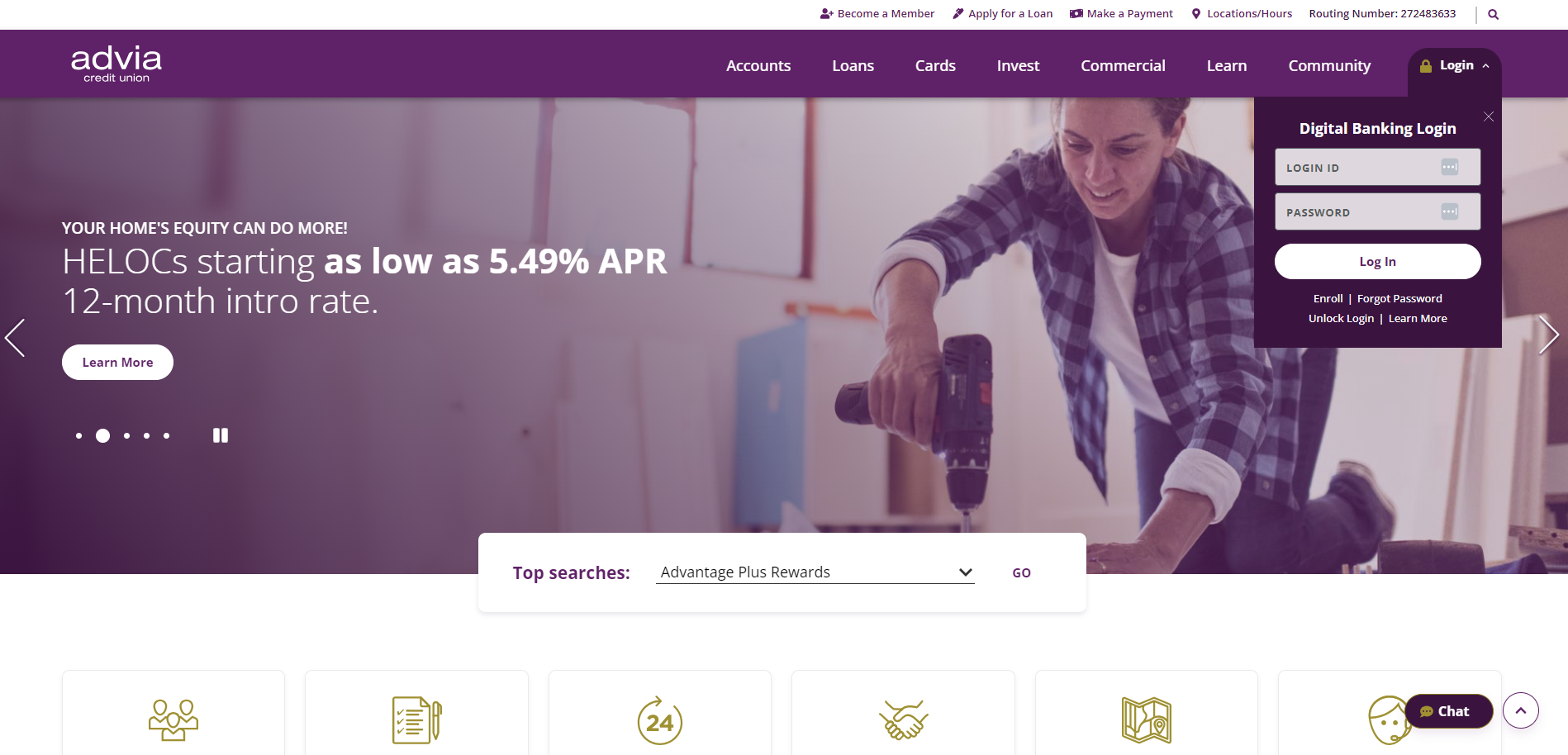ADVIA CREDIT UNION
Services we provide:
- Discovery
- Digital Strategy
- Content Analysis
- Custom Integrations
- UX/UI Design
- Website Development
- Hosting
- Support
About Advia Credit Union
Advia Credit Union has a mission to provide financial advantages to its members by providing advice, advocating for members, and offering advantages other financial institutions don’t. This is accomplished through innovative financial solutions and a new, scalable website. For this new site, Advia sought to proactively provide the quickest and easiest digital solution for members to get the best user experience. Advia is not like other financial institutions; this is illustrated in Advia’s commitment to serving the ever-changing financial needs of its members. One of its core values is to drive progress by engaging in a spirit of innovation and developing new digital service tools for its members. This led to an innovative website redesign to give members easy access to information digitally.
The Challenge
The old website was not intuitive, and the overall digital experience lacked. The lending areas of the old site for both mortgages and auto loans were not producing results. With increased in mobile traffic, the site needed an improved mobile user experience. A major challenge facing Advia’s business team was the organization and content hierarchy of the old site. The content was repetitive and text-heavy, and members were confused about where to find the information they sought. Other obstacles included Advia’s team being unable to easily update the content and structure of the pages on the old website.
Goals for the New Site:
- Improved navigation layout
- Measurable enhancements
- Increase time spent on the website
- Meets brand standards with redesign
- Increase overall visitors engagement
- Increase content management efficiency
Advia wanted to create a “one-stop” resource center to educate members on digital banking—including forms, links, documents, and video tutorials. Two goals for the new Advia Credit Union website were simplifying content and allowing self-service for members. Advia did not want to reinvent the wheel in terms of UI but wanted to deliver a better digital experience to its members and potential new members. The new website provides a clean and clear navigation experience to eliminate clutter and confusion.
The Right Platform
SilverTech reviewed several CMS/DX platforms with Advia. Progress Sitefinity was the chosen platform, giving Advia a fully optimized digital experience. Using the page templates on the Sitefinity platform allows Advia to accomplish the goals for the new site by enhancing the design and layout of the website with ease. The new website improves the user experience with the use of properly placed navigation buttons and call to actions (CTAs) clearly directing users through the content on the page to the sub-pages. Advia’s site has an engaging navigation and advanced filter functionality allowing users to get to the content they are looking for with ease. Additionally, the Advia content team can seamlessly update and create pages within the Sitefinity CMS, keeping the website current and relevant.
RESULTS
Data Privacy Laws Update: January 2025
By: Paul Creme | 2/11/25
Starting this year, about twenty states already have, or will soon, adopt privacy laws similar to California's.
California adopted its privacy law statute in 2018, which was modeled to a degree upon the EU-GDPR regulation adopted by the European Union, also in 2018. Since then, California has amended the law, and it is now known as the California Privacy Rights Act (the “CPRA”).
The following states have chosen to adopt some form of a privacy statute or regulation including Colorado, Connecticut, Delaware, Indiana, Iowa, Kentucky, Maryland, Minnesota, Montana, Nebraska, New Hampshire, New Jersey, Oregon, Rhode Island, Tennessee, Texas, Utah, and Virgina. It is likely that others will soon follow.
Given the considerable number of states that have chosen to codify rights to privacy in personal data, it makes sense for your business to review your company’s website with your counsel to confirm it is fully compliant.
Although each state has slightly different rules and effective dates, most states have made the law effective as of January 1, 2025. While certain states have grace periods, it is best practice to review your website’s privacy policies as soon as possible.
Companies often reference the EU-GDPR and California statute specifically. If your company does business across state lines, state specific language may not be appropriate. Also, while you may believe that you do not have to worry about crossing state lines, remember it is more than likely that a consumer from another state may access your website, and thus, the law in their state would apply. Given the wide range of states, this possibility is exceedingly high.
Pro-Active Steps You Should Consider Implementing
- Determine what state laws, if any, apply to your business. This may be appropriate if you are very state centric, but a better approach may be to be more general in your approach and reflect this language on your website.
- Identify and categorize your processed personal data to understand your obligations. It may differ from state to state, so be sure to work with your attorney to make sure you are in compliance with the most stringent data retention requirements and be sure website users always have the right to be forgotten. Ensure your privacy policies are transparent and reflect the new legal requirements.
- Strengthen your internal data protection practices to safeguard consumer information. Review service provider agreements with vendors that process personal information on behalf of your business. Don't forget, if your company uses third parties to process information, ensure they follow the same data procedures regarding the data they process.
- Be prepared to comply with requests from consumers concerning privacy rights. This includes rights to opt-out of sale or deletion and return of personal information. It is crucial to educate your staff about the new laws and their roles in maintaining compliance.
We cannot provide specific legal advice regarding the wording that may be most appropriate for your company, but we can assist you in making website changes your company deems as necessary. This could include content updates, content integration with data privacy, and content management tools.
Reach out to contact your account manager with any questions.



